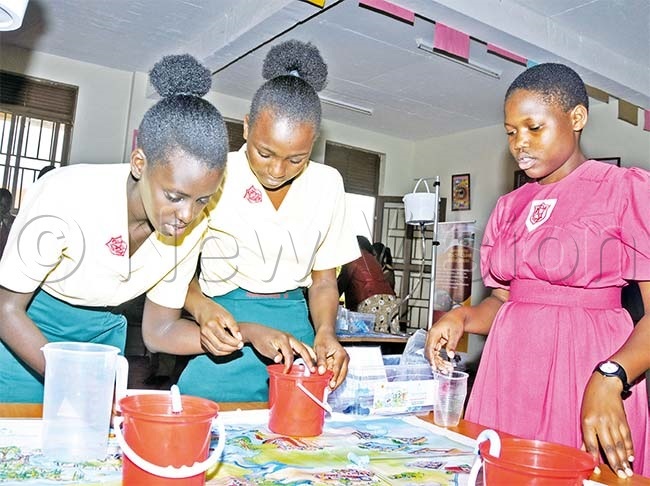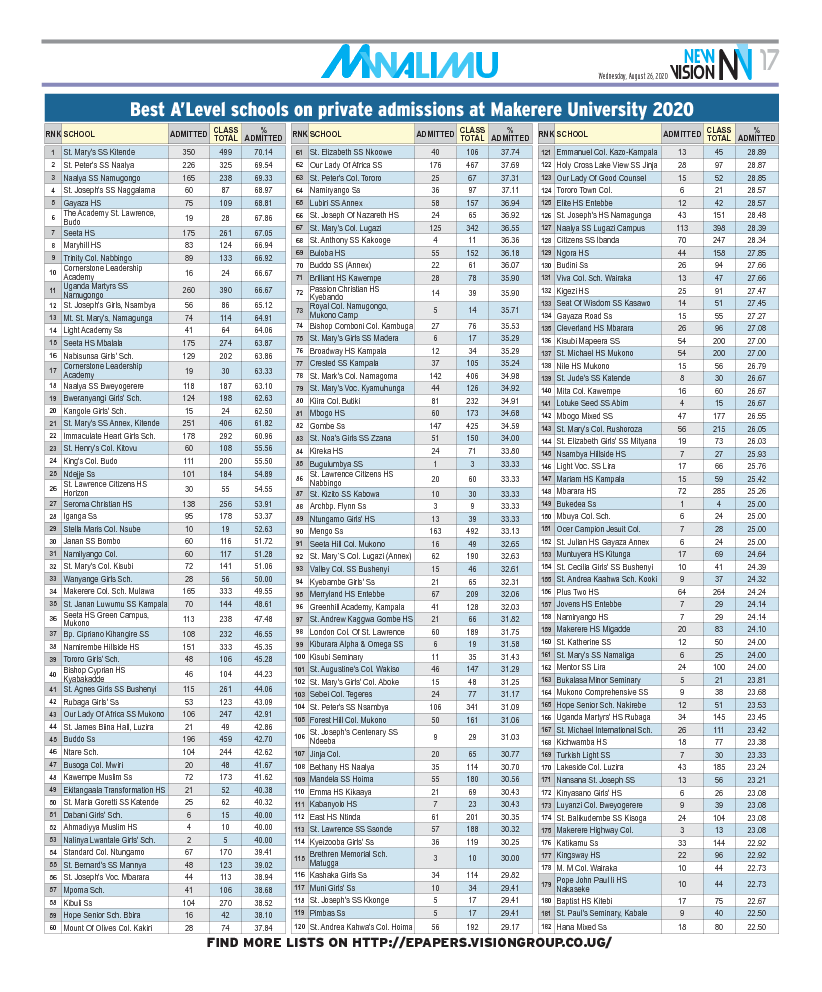Makerere private admissions: Private schools excel
UNIVERSITY |
Private schools have once again topped the country's A'level schools in having the highest number of students admitted on private sponsorship to Makerere University.
Apart from Gayaza High School, Trinity College Nabbingo, Nabisunsa Girls School and Bweranyangi Girls, which are government-aided, the rest of the top 20 schools are privately -owned or mission institutions.
Among the top 10, St Mary's SS Kitende, St Peter's Naalya, and Naalya SS Namugongo, which are all private schools, have the highest number of students admitted to Makerere University.
In the fourth position was St Joseph's SS Naggalama, followed by Gayaza High School, the Academy of St Lawrence, Seeta High School, Maryhill High School, Trinity College Nabbingo and Cornerstone Leadership Academy and Uganda Martyrs SS Namugongo. Gayaza HS, Maryhill High School and Trinity College Nabbingo, are government-aided schools, while the rest are privately-owned.
The ranking was based on schools with the highest percentage of students admitted on private sponsorship, in comparison to the number of candidates per institution, who sat Senior Six national examinations in 2019.
The ranking only considered Makerere University, since it always admits almost half of the entire country's S6 leavers with the other half absorbed in the remaining 50 universities in the country.
Disturbing trend
Director of basic and secondary education Ismael Mulindwa says there is need to ensure that there are more public traditional schools topping the country's ranking.
"There is no reason why traditional schools should not excel. We pay their teachers' salaries and support them with infrastructure, on top of them having big budgets," he says.
Mulindwa adds: "It is surprising that some of the ‘weaker' private schools always outcompete many traditional schools."
He, however, adds that there is need to focus on the management of traditional government aided schools.
"Some people claim that private schools cheat, but that is a weak and illegitimate excuse. There was a case of schools which were cited to be strong in cheating. We assembled a strong team of scouts from Uganda National Examinations Board to monitor them and we realised that the schools kept improving instead," Mulindwa said.
"It is not bad for private schools to excel. It is a Government policy to have a liberalized education system. We just need to get public schools to be more accountable," Mulindwa added.
Higher education state minister Dr John C. Muyingo says: "Gradually, we need to have the performance targets set for all headteachers in public schools. May be, this will make them more accountable. They will work towards meeting the targets, which will improve their performance. We will discuss this matter further and come up with solutions."

The ranking
There were 1,210 schools that were considered in this ranking of A'level. About 20 schools, which did not have their results initially released by the Uganda National Examinations Board, were left out.
Many of the students who were admitted to Makerere this year are those who sat their Uganda Advanced Certificate Examinations (UACE) last year. A few are from the previous years.
This year, Makerere University admitted 15,000 students. This is a small number in comparison to an average of 25,000 students annually in the past.
According to the Uganda National Examinations Board, 104,476 candidates registered for the 2019 UACE from 2,298 centres, compared to 99,516 candidates from 2,094 centres in 2018. This is an increase of 4,960 candidates (5%). There were 103,429 candidates who sat the examinations, compared to 98,254 in 2018, an increase of 5,175 candidates (5.3%).
The private admissions list follows the one of Government one, which was released months ago. Private schools still topped the Government admissions in all public universities this year. There were a few public schools in the top 20. King's College Budo a public school, was followed by privately-owned St Mary's Kitende, Central College Mityana and Uganda Martyrs SS Namugongo.
The other public schools with a high percentage entry for the government sponsorships were Mt St Mary's College Namagunga, Maryhill High School and Gayaza High School. The private schools included Greenlight Islamic, God's Way High, St Andrea Kaahwa, Seeta High and St Julian High (Gayaza).
The ranking considered admitted students from Makerere University, Makerere University Business School, Kyambogo University, Gulu University, Busitema, and Mbarara University of Science and Technology.
What made these schools excel?
Several headteachers cite completing the syllabus on time, good discussion time for students, career guidance in selection of courses at the university and keeping the students focused.
However, schools having few students in a class could have contributed to better performance. Many students from such schools have been admitted to Makerere University this year.
Schools with small classes include St Joseph's SS Naggalama with 87 students, The Academy of St Lawrence with 28, Cornerstone Leadership Academy (Nakasongola) with 24, St Joseph's Nsambya (87), Light Academy SS (64) and Cornerstone Leadership Academy (Wakiso) with 24. Most of these schools are privately owned.
On the other hand, there are few traditional schools with small class sizes. Most of them have a high entry, given that they are very competitive at the time of admitting Senior Five students.
Jessica Amara, a teacher in a private school, says: "Regardless of traditional schools performance, many parents choose them. This is because of factors such as the good culture, their own former schools, good infrastructure, discipline and grooming qualities."
"No wonder the traditional schools have high entry of students at A'level, which may not necessarily translate in them topping the nation when admission rankings are done," she adds.
Schools with no student at Makerere
Data obtained from the Uganda National Examinations Board (UNEB) indicates that there were 1,972 schools, which had students sit the national examinations last year. However, of these, there are 762 schools, which did not have any student admitted to Makerere University.
Close to 30,000 students, according to sources in the academic registrar's office, had applied to be admitted to Makerere University. Most of the students who applied, never made it.
However, there are other 50 universities in the country, which will have to share the remaining lot of about 38,000 students.
Competition for vacancies at university remained high this year due to improved performance and increased number of A'level candidates who qualify for university entry.
Arts courses were better done than the science ones. However, that does not negate the fact that it remained very competitive to be enrolled on science courses, in all public universities as well.
This year, the cut-off points were raised for admissions to most of the science courses. This was the same trend, in the previous year's admissions.
Cut-offs are generated by scoring all applicants, and ranking them in the order of their performance per course. The person with the lowest points in performance determines the cut-off mark.
Admissions policy
Students in public universities are admitted on the basis of a maximum score of 20 points derived from three principal subjects and two subsidiaries in the same sitting.
Each principal subject carries a maximum six points, while the subsidiary subjects general paper, submaths or computer studies weigh a point each.
Director's Voice
Private schools are smarter on management and do a lot to ensure their teachers do their work. We need to ask our headteachers in Government-aided schools, to wake up and face the reality
Ismael Mulindwa, Director of basic and secondary education
Of the candidates who sat national examinations, more than half (65,723) qualified for university admission, up from 63,123 in 2018. This represents an increase of about 2,600, according to the Uganda National Examinations Board results. Prof. Mary Okwakol, executive director for the National Council for Higher Education
